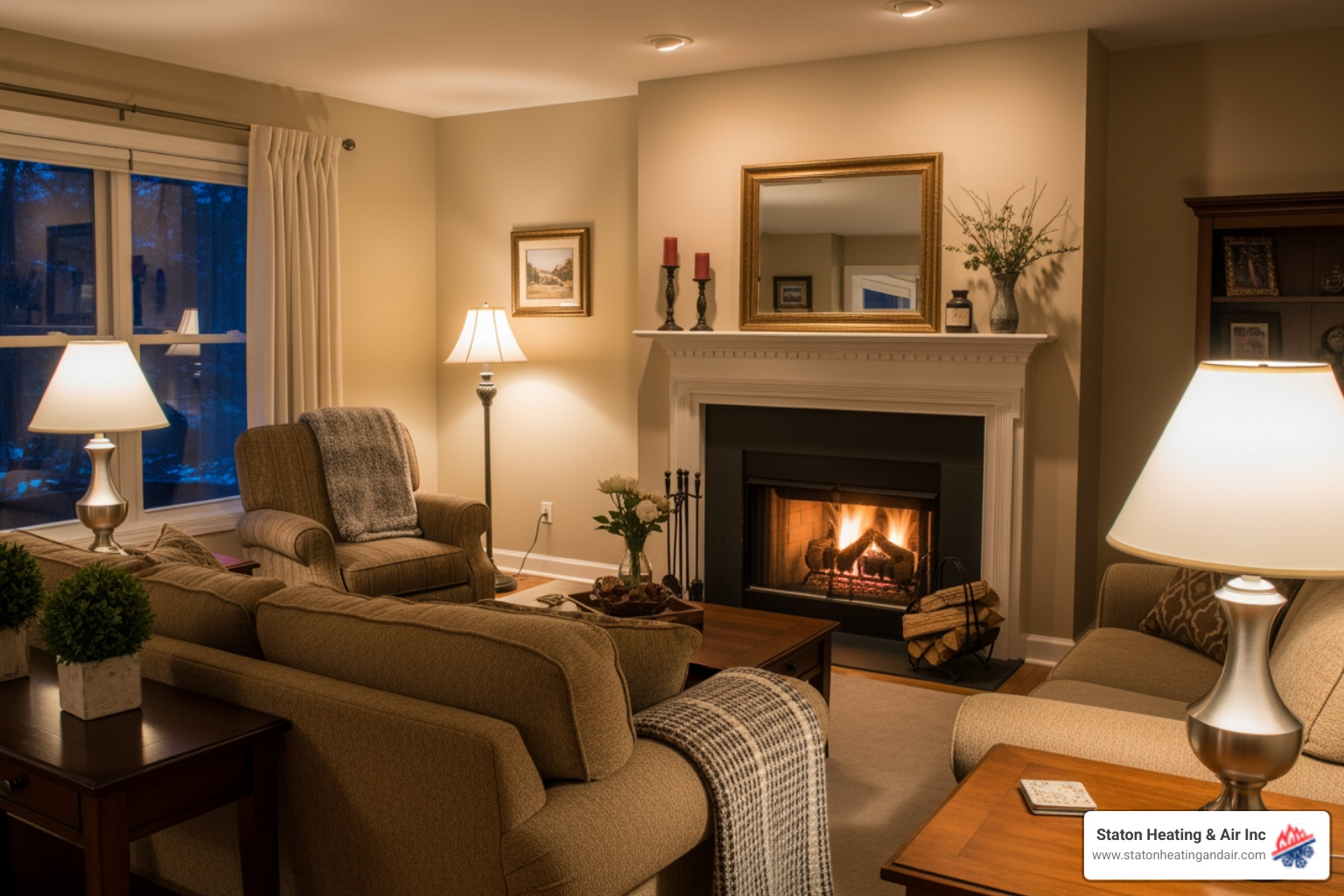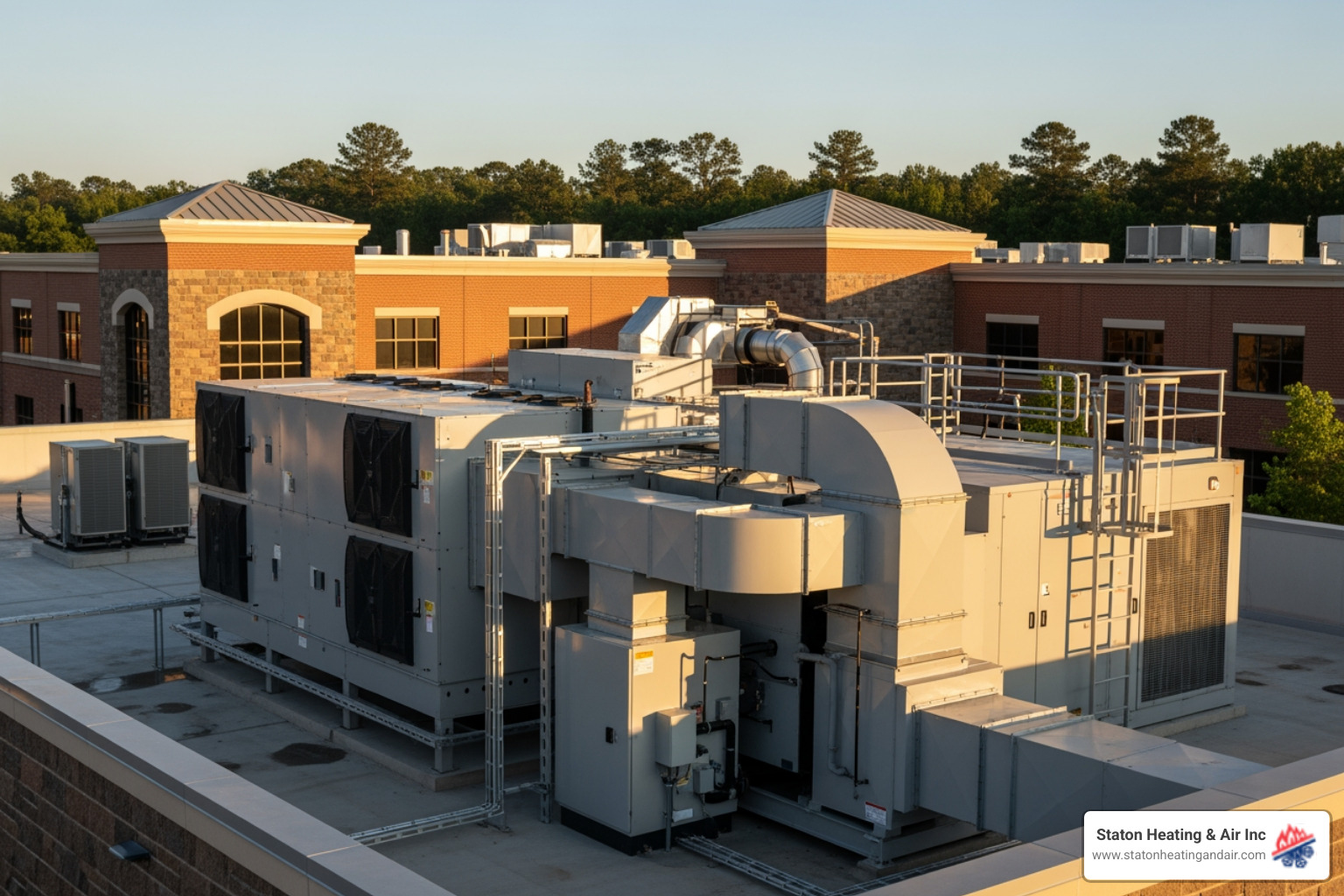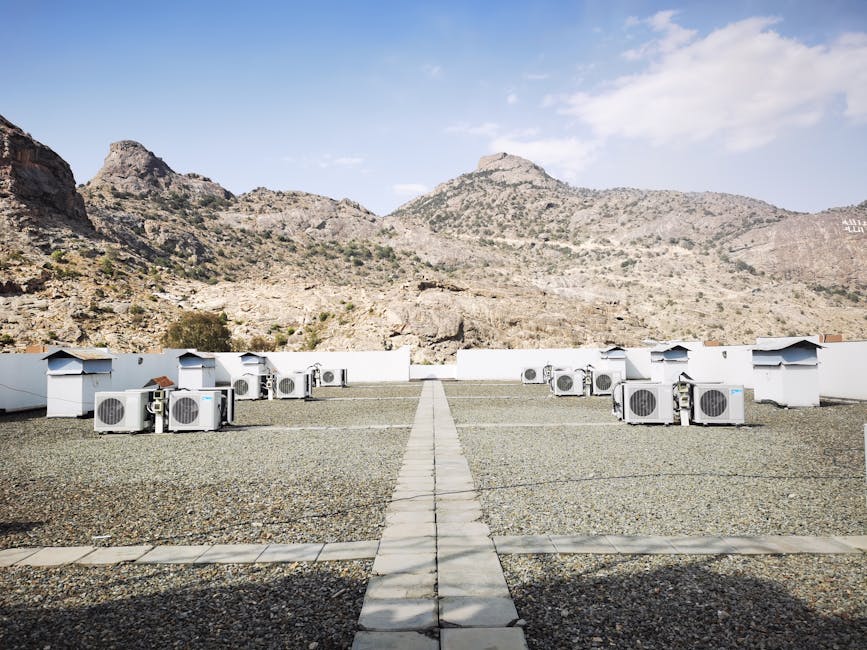Listen Up: Why Your AC is Singing the Blues (and How to Silence It)
Why Your AC Unit Making Noise Should Never Be Ignored
When your AC unit making noise becomes a problem, it's trying to tell you something important. Different sounds signal different issues, from simple debris removal to serious electrical problems that need immediate professional attention.
Common AC Noises and What They Mean:
- Banging/Clanking - Loose parts in compressor or unbalanced fan blades
- Buzzing - Electrical issues, frozen coils, or loose components
- Squealing/Screeching - Worn fan motor bearings or belt problems
- Hissing/Bubbling - Refrigerant leaks or high-pressure issues
- Rattling/Clicking - Debris in unit or failing electrical controls
Your air conditioner should run quietly. Loud or unusual sounds are warning signs that something needs attention. Ignoring these signals can lead to expensive repairs or complete system failure.
Many AC noises have straightforward causes. Some are simple DIY fixes, while others require professional expertise to diagnose and repair safely.
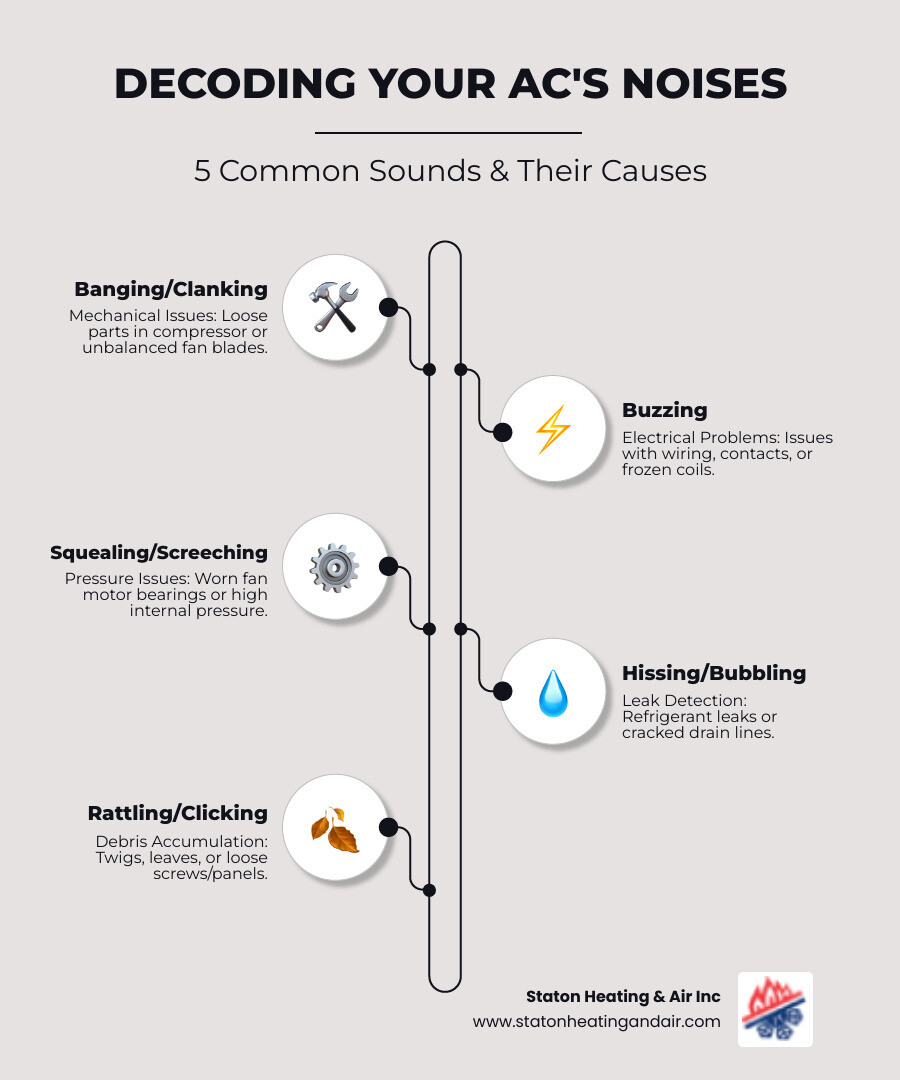
A Homeowner's Guide to Common AC Noises
Think of yourself as a detective when your air conditioner starts making strange sounds. Each noise tells a story about what's happening inside your system. Once you learn to decode these audio clues, you'll know whether to grab a screwdriver or call the professionals.
Let's walk through the most common culprits behind that AC unit making noise and what each sound means.
Banging or Clanking
A jarring banging or clanking sound indicates a serious mechanical issue that needs immediate attention.
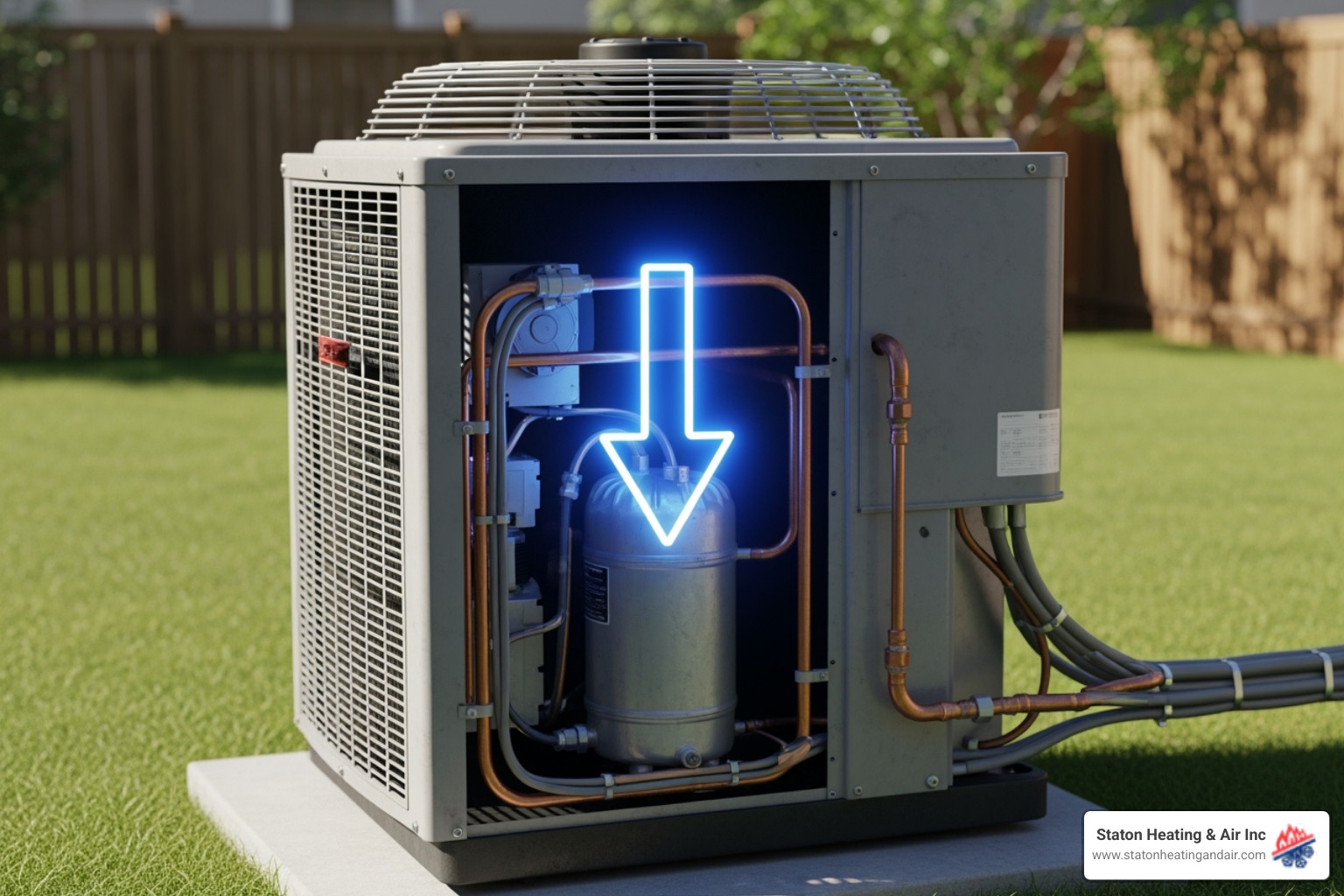
The compressor is usually the prime suspect. When internal parts like piston pins or connecting rods wear out or come loose, they create loud noises inside the unit.
Unbalanced fan blades are another common troublemaker. If the outdoor condenser fan or indoor blower blades get bent, cracked, or loose, they'll bang against the unit's casing with every revolution.
Sometimes the fix is simpler, like loose parts rattling as the unit vibrates. However, loud banging almost always requires professional diagnosis to prevent turning a fixable problem into a complete system replacement. For more insights, check out our guide on Strange AC Noises and Solutions.
What Causes a Buzzing AC unit making noise?
A buzzing AC unit making noise can signal a wide range of potential problems, from minor to severe.
Frozen evaporator coils are often behind a persistent buzz. When indoor coils ice up, usually due to a dirty air filter blocking airflow, the compressor struggles to push refrigerant, resulting in a loud, continuous buzz.
Electrical issues create some of the most concerning buzzing sounds. Loose wiring might produce a hum, while electrical arcing creates a distinct buzz that signals a potential fire hazard. A failing contactor relay switch can also buzz as it struggles to control power to your compressor. You can learn more about this critical component and find replacement options for the contactor relay switch.
Simpler causes like loose parts, dirty condenser coils, or a malfunctioning condenser fan motor can also create a buzz. If your unit is also vibrating excessively, our guide on Why Your AC Unit Is Vibrating Excessively can provide additional context.
Squealing or Screeching
Squealing or screeching sounds indicate problems you shouldn't ignore.
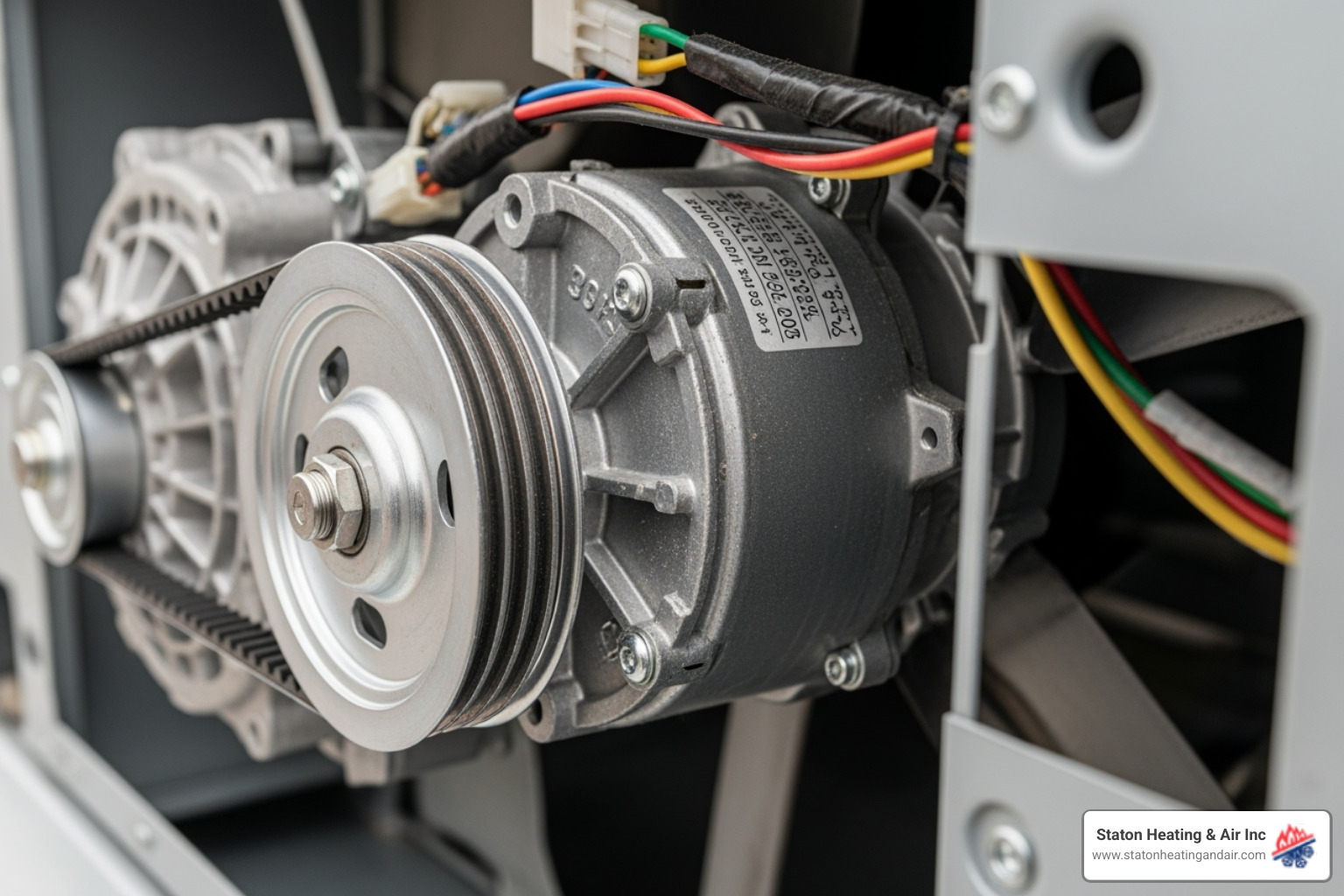
Fan motor bearings are the usual suspects. When the bearings in your indoor blower or outdoor condenser fan wear down, you get a high-pitched screech as metal grinds against metal.
A blower motor malfunction or a worn fan belt in older systems can create similar sounds.
Most concerning is squealing caused by high internal pressure in your compressor. This dangerous situation requires immediate shutdown of your unit. Acting quickly on squealing sounds can prevent expensive repairs. If these sounds developed suddenly, our Troubleshooting a Suddenly Noisy AC Unit guide offers valuable next steps.
Hissing or Bubbling
Hissing or bubbling sounds often indicate serious efficiency and safety concerns.
Refrigerant leaks are the most common cause of hissing. When refrigerant escapes through cracks in the lines, it creates a hiss, much like air escaping a tire. Severe leaks might sound like a high-pitched whistle.
Dangerous pressure levels within your system, such as a compressor valve leak, can also cause hissing and require immediate professional attention.
Bubbling sounds usually point to drainage problems. A cracked or blocked drain line can cause water to back up and air to escape through it, creating a bubbling noise.
Ductwork leaks can also create hissing sounds while wasting energy. Understanding what refrigerants are helps explain why leaks are serious. These sounds fall into the category of 4 HVAC Noises You Shouldn't Ignore.
What Causes a Rattling or Clicking AC unit making noise?
Rattling and clicking from your AC unit making noise deserve your attention, as they can range from simple fixes to failing electrical components.
Debris in your outdoor unit is often the easiest fix. Twigs, leaves, and rocks can get sucked into the condenser unit and rattle when the fan spins. A quick cleanup usually solves this.
Loose screws or panels can also create rattling as your unit vibrates.
Clicking sounds tell a different story. Brief clicks at startup or shutdown are normal. However, continuous, rapid clicking often signals a failing thermostat or electrical control failure. Faulty relays, bad capacitors, or loose connections might click repeatedly as they try to complete their circuits.
What seems like a minor rattle can lead to bigger problems if loose components cause wear on other parts. For comprehensive solutions, our guide on Resolving Unusual AC Sounds in Your Home provides detailed troubleshooting steps.
The Culprits Behind the Cacophony: Why Your AC Unit is Making Noise
Now that we've identified the sounds, let's explore the troublemakers behind the racket. Understanding why these noises happen will help you keep your AC running smoothly.
Worn Components and Loose Parts
Like any hardworking machine, your AC's components experience wear and tear over time. This aging process is a primary reason your AC unit making noise.
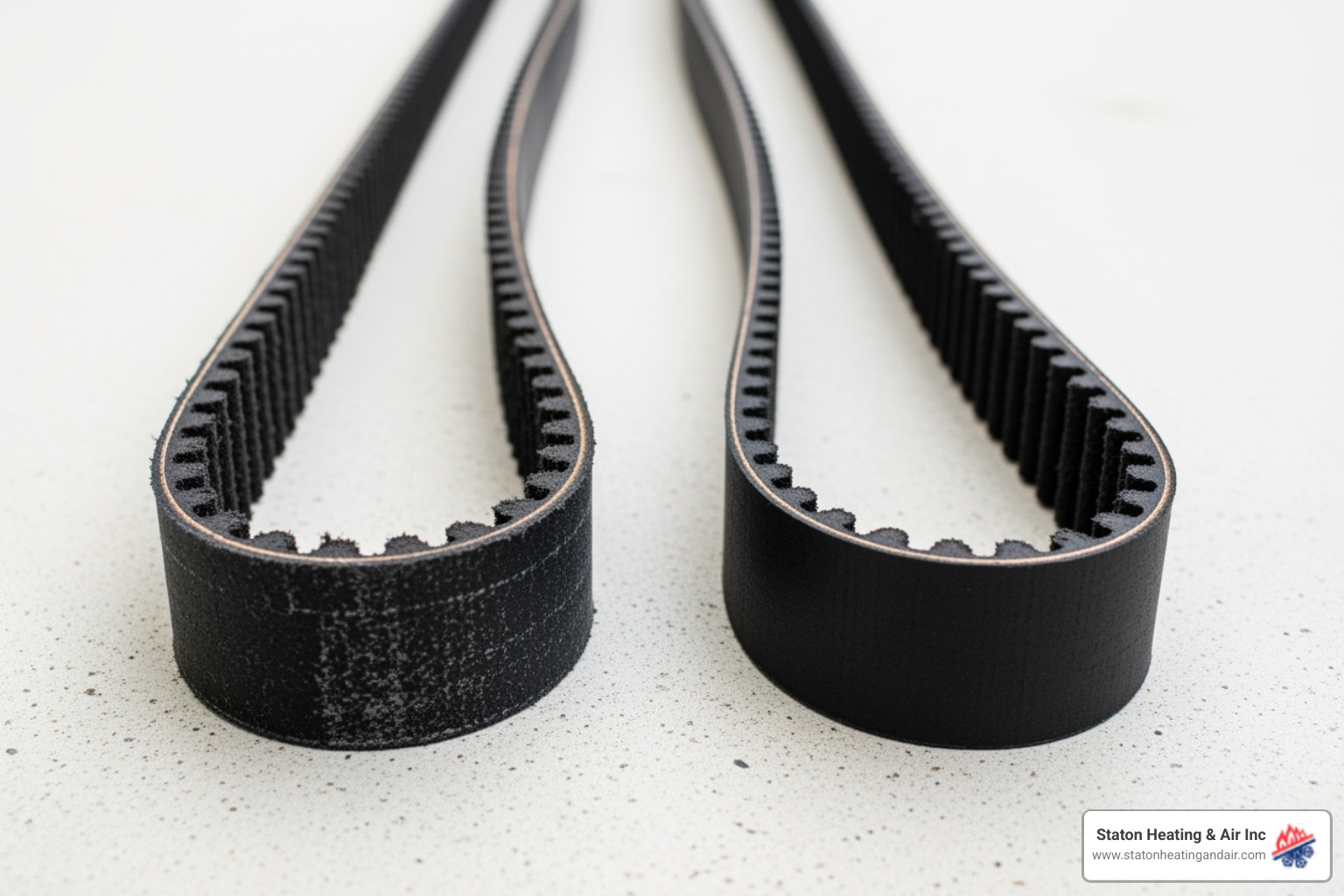
Bearings are common culprits. These parts allow your fan motors to spin smoothly. When bearings wear down, they create a grinding or squealing sound as metal rubs against metal, which can lead to motor failure.
Fan blades can also cause noise if they get bent, cracked, or loose. An unbalanced blade creates vibrations that can cause other components to loosen or wear out prematurely.
Motor mounts and other fasteners face constant vibration. Over time, screws can loosen, panels can rattle, and the rubber isolation feet that cushion your compressor can deteriorate. When these parts fail, normal operating sounds get amplified.
When wear and tear disrupts the balance of your AC system, noise is often the first warning sign. Understanding how air conditioners work can help you appreciate why maintaining this balance is crucial.
Electrical Gremlins and Faulty Controls
Electrical issues can cause mysterious buzzing, clicking, or humming sounds. These problems require a trained professional to diagnose safely.
A failing capacitor is a common electrical noise-maker. Capacitors provide the energy jolt to start your AC's motors. A weak capacitor might produce clicking or humming sounds, while a failed one often results in a continuous buzz as the motor tries unsuccessfully to start.
The contactor switch in your outdoor unit is another frequent source of electrical noise. This component controls the high-voltage power to your compressor and fan. Over time, its contacts can become pitted, leading to loud buzzing or humming. Visible sparking is a clear sign it needs immediate replacement.
Loose wiring can create buzzing or rattling sounds. More concerning is electrical arcing, where electricity jumps across gaps, creating crackling or buzzing sounds and a potential fire hazard.
Your AC's circuit board acts as the system's brain. A malfunctioning board might cause erratic clicking or buzzing. Electrical problems are not DIY territory due to high-voltage dangers. If you suspect electrical issues are causing your AC unit making noise, call our NATE-certified team at Staton Heating & Air Inc. for reliable HVAC Repair Service Alpharetta, GA.
The Chilling Effect: Frozen Coils and Airflow Problems
Sometimes your AC makes noise because it's getting too cold in the wrong places. Frozen evaporator coils or airflow restrictions create strain and unusual sounds.
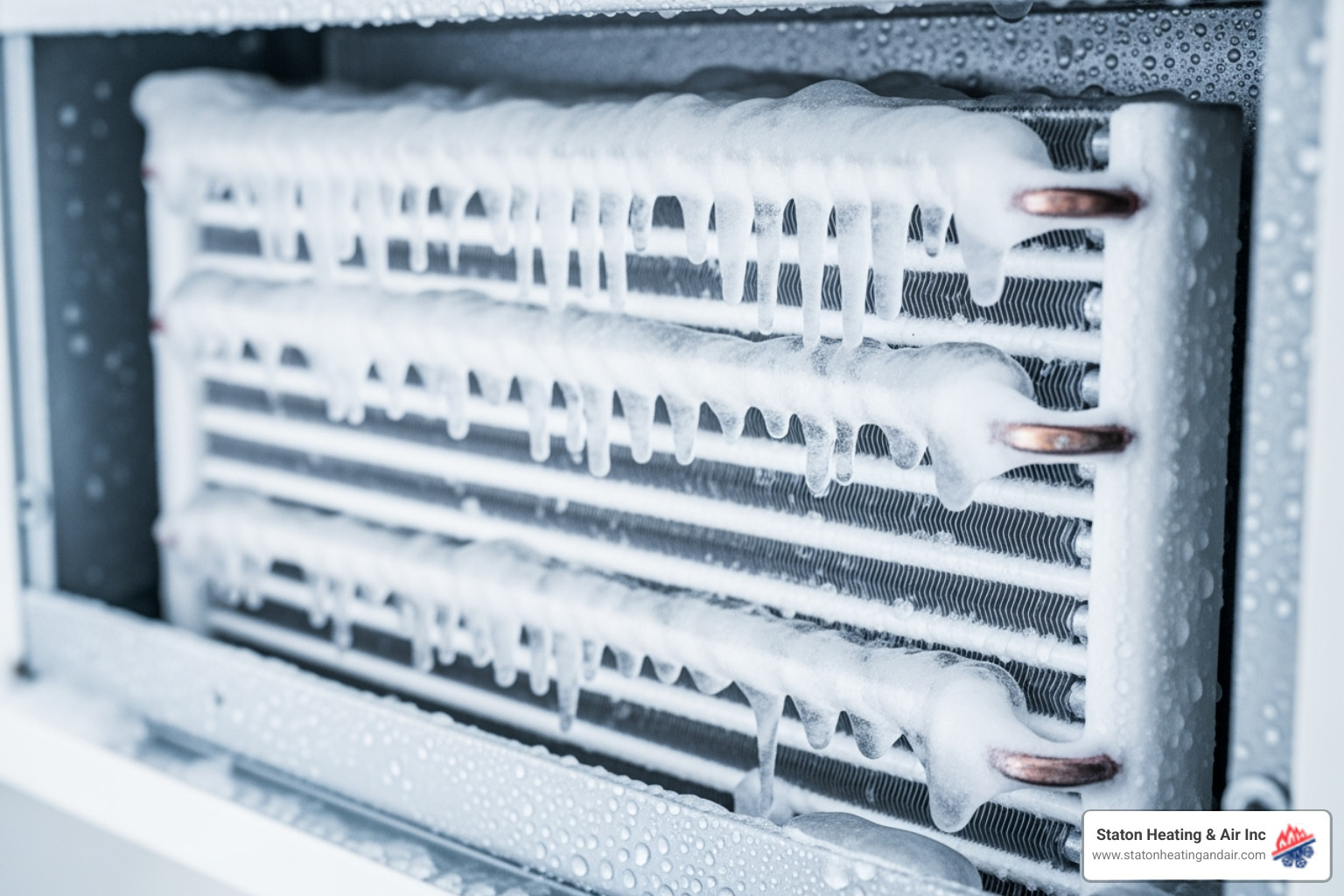
Your evaporator coils need a steady flow of warm indoor air. When this airflow is restricted, the coils can freeze. The most common culprit is a dirty air filter.
When coils freeze, your compressor works much harder, often producing loud buzzing or humming sounds. You might also hear hissing or bubbling as the ice melts.
Blocked vents can create similar problems. When vents are covered, your system can't move air properly. This leads to reduced airflow, frozen coils, an overworked compressor, noise, and reduced cooling efficiency.
Low refrigerant levels can also cause coils to freeze. This puts tremendous strain on your compressor, which may respond with loud buzzing, humming, or banging sounds.
Ironically, an AC with frozen coils works harder while cooling less effectively. Addressing airflow problems early reduces noise, improves efficiency, and prevents serious damage.
DIY Fixes vs. Calling the Pros
When your AC unit making noise, you might wonder if it's a DIY fix or a job for a pro. Some problems are simple to solve, while others require the expertise of trained professionals to avoid bigger headaches or safety hazards.
Here are some simple fixes you can try first, followed by red flags that mean it's time to call for help.
Simple DIY Troubleshooting Steps
Many common AC noises can be resolved with basic homeowner maintenance. Always turn off the power to your AC unit at both the thermostat and the circuit breaker before you begin.
- Check your air filter. A clogged filter can cause whistling, humming, or buzzing. Check your filter monthly and replace it every one to three months.
- Clean your outdoor unit. Your condenser can collect leaves, twigs, and grass clippings. This debris can rattle or get caught in the fan. With the power off, carefully remove any visible debris.
- Tighten exterior panels. Vibration can loosen the screws on your unit's outer casing, causing rattling and buzzing. Gently tighten them with a screwdriver.
- Clear the condensate drain line. Bubbling or gurgling sounds can mean a clogged drain line. Locate the PVC pipe from your indoor unit and clear any visible blockages. Pouring a cup of distilled vinegar mixed with water down the line can help prevent future buildup.
- Check your thermostat settings. Ensure it's set to "Cool" with the fan on "Auto" and the temperature is set correctly.
If your AC unit making noise persists after these fixes, it's time to call the professionals.
Red Flags: When to Immediately Call for AC Repair
Some AC problems are warning signs that require an expert to prevent a manageable issue from becoming a catastrophic failure.

- Hissing sounds: This usually means a refrigerant leak, which requires an EPA-licensed technician to handle safely. A leak will only get worse, reducing efficiency and potentially damaging the compressor.
- Screeching or squealing noises: These often signal serious mechanical problems, like failing motor bearings or a compressor under dangerous pressure. Turn off your unit immediately at the thermostat and circuit breaker, then call for help. Continuing to run it could turn a repair into a replacement.
- Loud banging or clanking: This sound indicates a major component, like a part in the compressor, has come loose. These issues need professional diagnosis and specialized tools.
- Any burning smell with electrical buzzing: This combination signals electrical danger, like overheating wires or a short circuit. Turn off the power immediately and call for emergency service, as this is a fire hazard.
- Continuous clicking: While a single click at startup is normal, rapid or continuous clicking suggests a problem with your thermostat or other electrical controls.
- If DIY steps don't work: If you've tried our simple troubleshooting and the noise persists, the problem is deeper than basic maintenance. Let our NATE-certified technicians handle it.
At Staton Heating & Air Inc., we've helped Metro Atlanta homeowners since 1972. When you encounter these red flags, contact our Air Conditioning Repair Experts Metro Atlanta team.
Frequently Asked Questions about Noisy AC Units
We get a lot of questions from homeowners in Cumming and Metro Atlanta about their AC unit making noise. Here are the top three.
Why did my AC unit suddenly start making a loud noise?
A sudden loud noise from your AC is alarming and almost always means a part has broken or come loose. Common culprits include a cracked or loose fan blade, a failed motor mount, or a broken component inside the compressor.
Catching these issues early can prevent a complete system breakdown. The key is acting fast—turn off your unit immediately. Continuing to run it when it's making sudden loud noises can turn a manageable repair into a major replacement.
Are some AC noises normal?
Yes, some sounds are perfectly normal. Your air conditioner isn't designed to be completely silent. A soft humming or gentle whirring sound during operation is expected. You'll also hear a brief clicking sound when your unit starts up or shuts down, which is just the thermostat and electrical components working.
However, any new, loud, or persistent noises like banging, squealing, or buzzing are not normal and signal a problem. If your unit sounds different than usual, trust your instincts and call a professional.
Can a dirty filter really cause my AC to make noise?
Absolutely. A clogged air filter can be the root cause of several different types of AC unit making noise. When the filter is packed with debris, it blocks airflow and forces your unit to work much harder, often resulting in a strained humming or whining sound from the blower motor.
Restricted airflow can also cause your evaporator coils to freeze up. When this happens, you might hear buzzing as the compressor struggles to push refrigerant through the ice, or hissing and bubbling as the ice melts. A simple filter change can prevent many problems. We recommend checking your filter monthly and replacing it every one to three months.
Restore Your Peace and Quiet
Your home should be a quiet, comfortable sanctuary. A noisy AC unit is more than an annoyance; it's a signal that your system needs attention. These strange sounds are your air conditioner's cry for help. A properly functioning system should run quietly in the background, not interrupt your daily life.
Ignoring unusual AC noises is like ignoring a small leak in your roof—what starts as a minor inconvenience can quickly escalate into a major disaster. A simple rattle can lead to damaged fan blades, while a slight buzz could progress to a dangerous fire hazard. That persistent squeal could result in complete motor failure, leaving you with a sweltering home in the middle of summer.
Regular maintenance is your first line of defense. Changing air filters, clearing debris from your outdoor unit, and scheduling professional tune-ups helps your system run quietly and efficiently. But when noises persist, professional expertise is invaluable.
The NATE-certified experts at Staton Heating & Air Inc. have been restoring peace and quiet to homes throughout the Metro Atlanta area since 1972. We understand that every squeal, bang, and buzz tells a story, and we know how to fix the problem right the first time.
Don't let a noisy air conditioner disrupt your comfort. If your system is making any of the disruptive noises we've discussed, it's time to call the professionals. For expert service that brings harmony back to your home in Cumming and throughout Metro Atlanta, schedule your AC Repair in Alpharetta, GA today.
Recent Posts
What Our Customers Are Saying


Ready to Transform Your Home?

Recent Blog







